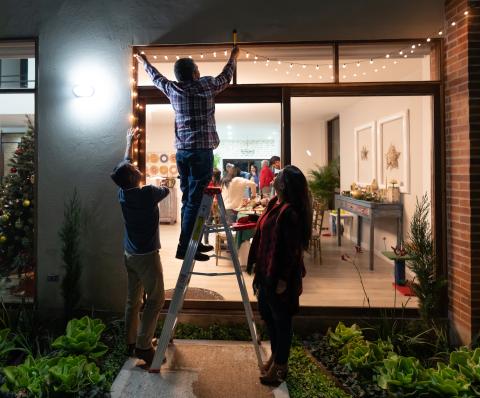Experts Offer Health and Safety Tips for the Holidays
Published on November 23, 2021
What other things can we do to keep the holidays merry … and safe? Check out this expert advice:
- Don’t forget your flu shot. Busy with preparations for the holidays, and perhaps having focused exclusively on their COVID-19 shot and booster, many people have not yet made time to be immunized against the seasonal flu. The Centers for Disease Control and Prevention (CDC) says that it’s not too late! Holiday travel and crowds increase the likelihood that we’ll be exposed to the flu virus. So head on in and get that shot. It is practically pain-free these days, and who knows? You might even walk out sporting a festive band-aid.
- Take care lifting packages. Today, instead of donning our masks and heading to the mall, more of us than ever are going online to order gifts, which are delivered right to our front porch. It’s convenient—but be careful when you pick up those boxes. The American Academy of Orthopaedic Surgeons reminds us to bend at the knees, not the waist, when lifting. Don’t twist your body. Instead, point your toes in the direction you are headed, and turn your entire body in that direction. And take care if snow and ice are present.
- Protect your feet when you’re hanging lights. It seems like everyone knows someone who broke and an arm or a leg while decorating their home or the Christmas tree. Dr. Pedro Cosculluela, an orthopedic surgeon from Houston Methodist Hospital, reports that many people also suffer a lesser-known, painful injury that often requires surgery. “A heel bone fracture is a terrible, life-changing event, and I see too many of these cases around the holidays after people fall off their ladders,” says Dr. Cosculluela. Be very careful while decking the halls!
- Watch the dough. No, we’re not talking about Hanukkah or Christmas monetary gifts. Instead, this is a reminder that unbaked batters and doughs can pose a food safety danger. Most people have heard warnings not to eat cookie dough because of bacteria that can lurk in raw eggs. But did you know that raw flour, too, can contain dangerous bacteria? The U.S. Food and Drug Administration (USDA) says no to sampling doughs and batters of any kind, whether it’s for cookies, cakes, bread, or tortillas.
- Be careful removing icicles. If you live in a cold part of the country, or you’re visiting loved ones who do, that can mean icicles. Emergency medicine doctors from Loyola University Medical Center in Illinois say that if you are going to remove icicles from your home, do so safely. Wear protective gear to avoid injury to your head, hands and eyes. Tap icicles lightly to gently dislodge them so they won’t fall and splinter. “You shouldn’t be on a snow-covered roof unless you are a professional specially equipped and trained to handle the dangers,” warns Dr. Mark Cichon. “Paying a service rather than risking your health may be a wise investment.”
Source: IlluminAge AgeWise
